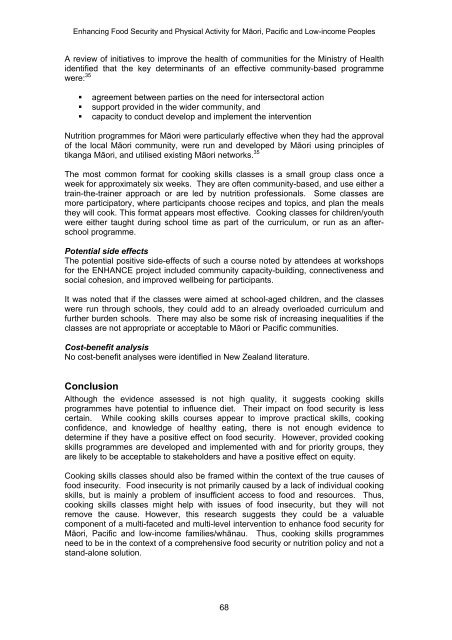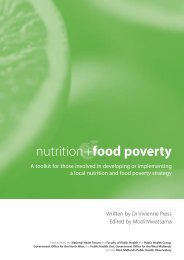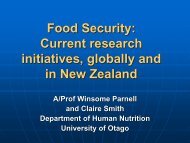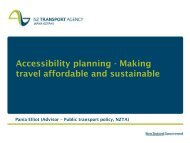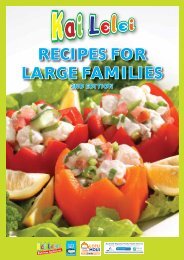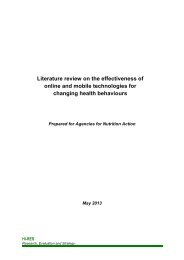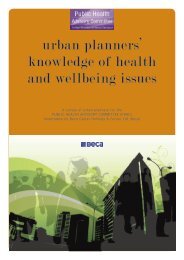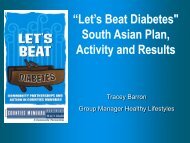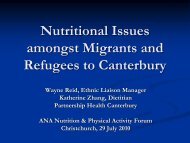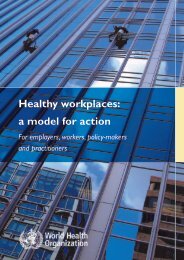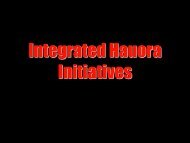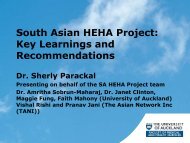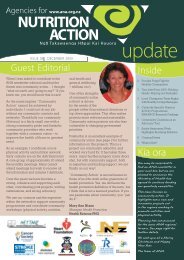enhancing food security and physical activity for maori, pacific and ...
enhancing food security and physical activity for maori, pacific and ...
enhancing food security and physical activity for maori, pacific and ...
- No tags were found...
Create successful ePaper yourself
Turn your PDF publications into a flip-book with our unique Google optimized e-Paper software.
Enhancing Food Security <strong>and</strong> Physical Activity <strong>for</strong> Māori, Pacific <strong>and</strong> Low-income PeoplesA review of initiatives to improve the health of communities <strong>for</strong> the Ministry of Healthidentified that the key determinants of an effective community-based programmewere: 35• agreement between parties on the need <strong>for</strong> intersectoral action• support provided in the wider community, <strong>and</strong>• capacity to conduct develop <strong>and</strong> implement the interventionNutrition programmes <strong>for</strong> Māori were particularly effective when they had the approvalof the local Māori community, were run <strong>and</strong> developed by Māori using principles oftikanga Māori, <strong>and</strong> utilised existing Māori networks. 35The most common <strong>for</strong>mat <strong>for</strong> cooking skills classes is a small group class once aweek <strong>for</strong> approximately six weeks. They are often community-based, <strong>and</strong> use either atrain-the-trainer approach or are led by nutrition professionals. Some classes aremore participatory, where participants choose recipes <strong>and</strong> topics, <strong>and</strong> plan the mealsthey will cook. This <strong>for</strong>mat appears most effective. Cooking classes <strong>for</strong> children/youthwere either taught during school time as part of the curriculum, or run as an afterschoolprogramme.Potential side effectsThe potential positive side-effects of such a course noted by attendees at workshops<strong>for</strong> the ENHANCE project included community capacity-building, connectiveness <strong>and</strong>social cohesion, <strong>and</strong> improved wellbeing <strong>for</strong> participants.It was noted that if the classes were aimed at school-aged children, <strong>and</strong> the classeswere run through schools, they could add to an already overloaded curriculum <strong>and</strong>further burden schools. There may also be some risk of increasing inequalities if theclasses are not appropriate or acceptable to Māori or Pacific communities.Cost-benefit analysisNo cost-benefit analyses were identified in New Zeal<strong>and</strong> literature.ConclusionAlthough the evidence assessed is not high quality, it suggests cooking skillsprogrammes have potential to influence diet. Their impact on <strong>food</strong> <strong>security</strong> is lesscertain. While cooking skills courses appear to improve practical skills, cookingconfidence, <strong>and</strong> knowledge of healthy eating, there is not enough evidence todetermine if they have a positive effect on <strong>food</strong> <strong>security</strong>. However, provided cookingskills programmes are developed <strong>and</strong> implemented with <strong>and</strong> <strong>for</strong> priority groups, theyare likely to be acceptable to stakeholders <strong>and</strong> have a positive effect on equity.Cooking skills classes should also be framed within the context of the true causes of<strong>food</strong> in<strong>security</strong>. Food in<strong>security</strong> is not primarily caused by a lack of individual cookingskills, but is mainly a problem of insufficient access to <strong>food</strong> <strong>and</strong> resources. Thus,cooking skills classes might help with issues of <strong>food</strong> in<strong>security</strong>, but they will notremove the cause. However, this research suggests they could be a valuablecomponent of a multi-faceted <strong>and</strong> multi-level intervention to enhance <strong>food</strong> <strong>security</strong> <strong>for</strong>Māori, Pacific <strong>and</strong> low-income families/whānau. Thus, cooking skills programmesneed to be in the context of a comprehensive <strong>food</strong> <strong>security</strong> or nutrition policy <strong>and</strong> not ast<strong>and</strong>-alone solution.68


